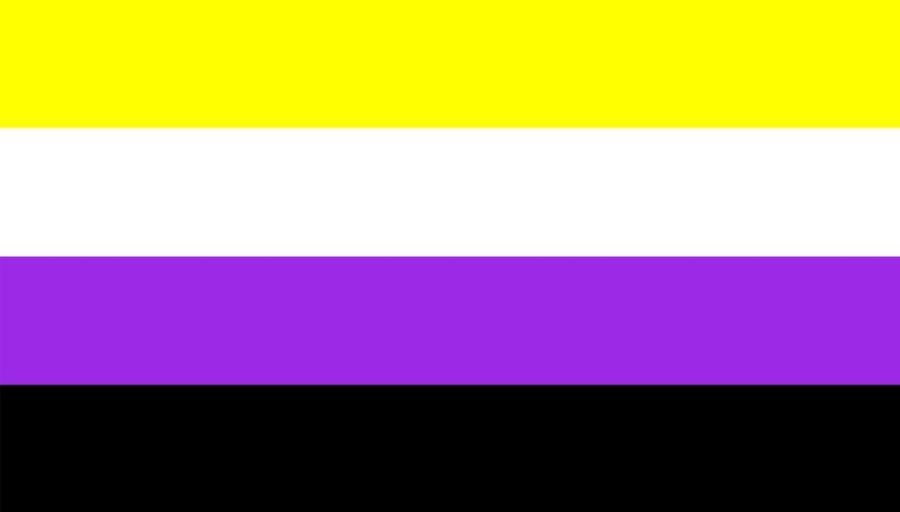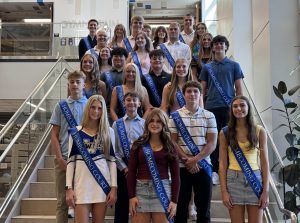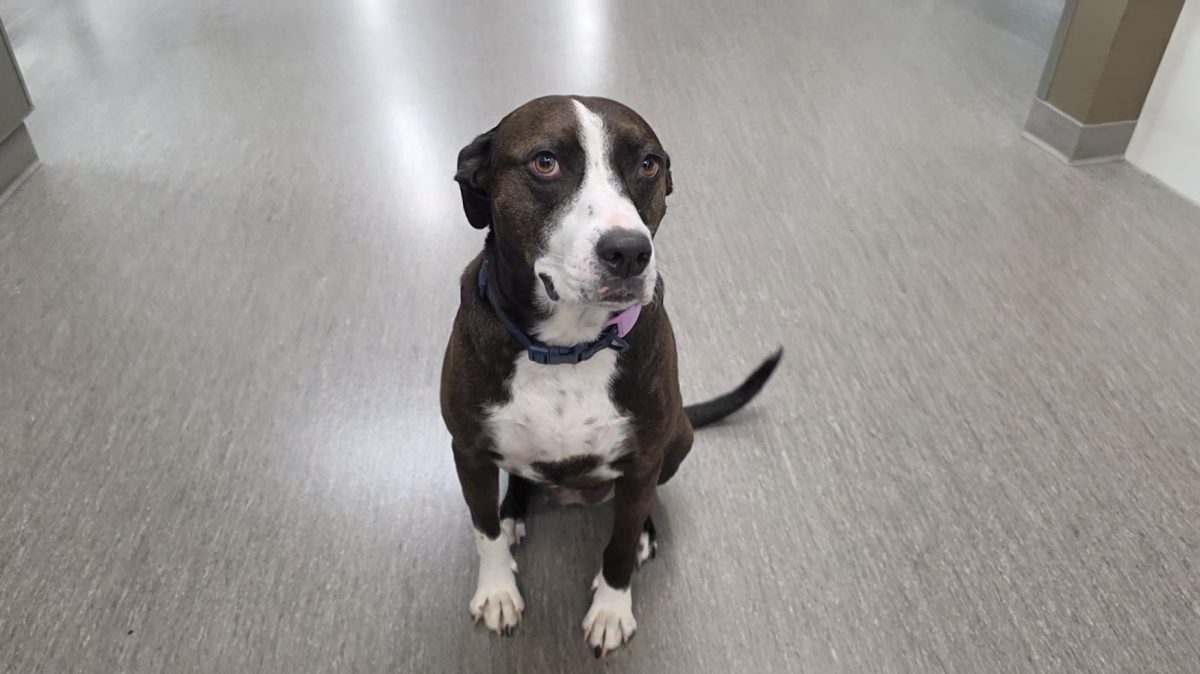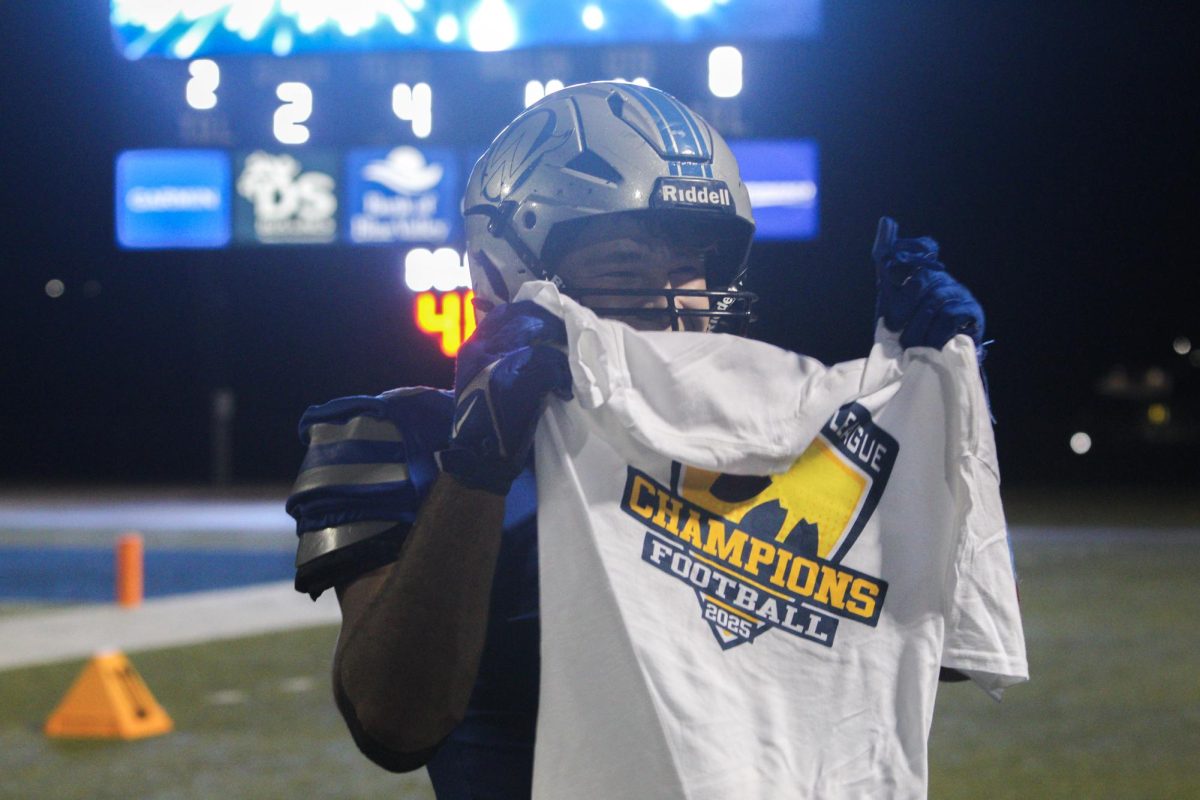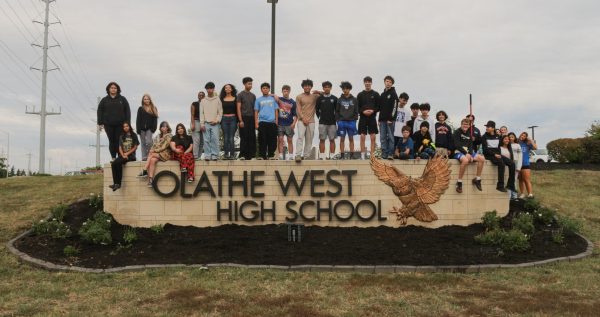Binary? What Binary?
According to grpride.org, Kye Rowan created the nonbinary pride flag, which has yellow, white, purple, and black horizontal stripes, in 2014. It is intended to represent nonbinary people who did not feel that the genderqueer flag represents them.
December 10, 2022
I’m non-binary. I’ve never outright said that I’m non-binary. I always just said that I use they/them pronouns. I was never fully comfortable saying it so bluntly. The constant fear of being rejected and left behind, solely because I consider myself non-binary, has been too crippling for me to express the fact. Some people may find that shocking – that I’m scared to express myself completely – but sometimes, depending on the people you’re around, expressing those things can be a matter of life or death.
What is Non-Binary?
Even though it’s such a hated thing, I feel like nobody really knows what being non-binary actually is. To be fair, everyone has a different definition of it, so it’s kind of difficult to pinpoint one set in stone meaning. According to the dictionary, being non-binary is an umbrella term for gender identities that don’t fit in with the male or female labels.
For me personally, being non-binary is an odd thing. Not odd in the sense of it being weird, but odd in the sense that my personal definition changes every few months. To me, being non-binary is where I feel like I don’t fit into any gender identity label. But it’s more than that. It’s so hard trying to put this feeling into words.
I realized that I was non-binary a year ago, and I still don’t have a clear meaning of it for myself.
I’ve tried to explore many of the labels, but none of them really stick with me. All of them either felt too feminine, or too masculine, or it just didn’t fit me.
Sometimes I feel like the simple label of “non-binary” doesn’t fit me much either. But, it’s kind of the only way to put a word to how I feel about gender. I just know that I hate being seen as a feminine person. It makes me cringe just to think about it. I prefer to be seen as more of a masculine person, but it’s hard for people to see me like that when I don’t dress like it. But, I also don’t want to be seen as just masculine either. I like the idea of being seen as neither, as my own thing — in between.
What’s it like being non-binary: My personal experience
I grew up in a smaller town in the suburbs of Dallas called Midlothian. It has a population of about 30,000, but it’s still significantly smaller than Olathe.
Growing up in a tiny Texas town, you can imagine how limited my education of different sexualities was. As a child, my parents didn’t push beliefs on me, as most parents do to their children. They let my brother and I figure out what we wanted to think, and I really appreciate that they did that.
As I got older though, and started getting involved with social media, I found how I wanted to think. I found out very quickly that my ideals were uncommon where I lived.
In eighth grade, I had a crush on a close friend of mine who was a girl. That was the start of my sexuality and gender journey. I saw nothing wrong with being bisexual and not cisgender, and I wasn’t afraid to hide it. Though, soon after I opened up about it, I began to get bullied for being an open queer person.
That same year, we were put into lockdown and quarantine for COVID-19. As we all know, a lot of issues became apparent and political issues were on the rise. With all of that, going back to school at the beginning of my freshman year, I had lost a large amount of friends, and continued to be teased and made fun of for my opinions.
It was honestly very degrading and dehumanizing how much I was being looked down on. I knew that I was the odd one out. Everyone knew my opinions and that I was queer. I constantly felt like eyes were on me, watching me, judging me. And they were, I knew this. They weren’t very subtle about it. With all the new looks, new fear came along with them.
I had always heard horror stories about hate crimes, and with my environment, it wasn’t dumb to assume that I could be a target. I was always afraid of something happening to me, solely because I wasn’t straight.
When the idea of moving was brought up in my house, I honestly felt a mixture of immense fear, as well as hope. I was hopeful that a new place, more people, and a non-Southern state would allow me to freely express myself. Despite Texas having such an intense political atmosphere, I loved it. I loved the large amount of diversity that was around me. The good food, different cultures, among everything else, I did really love living there. It was just scary being there sometimes.
Once I moved here, I instantly noticed a difference in the environment. Most of the people here are very accepting, and people aren’t afraid to express themselves however they want. There are five times as many people here, so there’s bound to be a larger variety of people and beliefs. It’s very freeing. I’m allowed to be myself without there being eyes on me at all times.
It was scary having to start over. I was scared to make friends and meet new people. I had been made fun of and looked down on by my peers, that it was still a fear of mine.
I’m lucky that I made such accepting friends. Sure, there will always be people that’ll be hateful, but I have surrounded myself with people who want the best for me and who enjoy me for who I am.
How to help yourelf or your non-binary friends!
The easiest and most common way to help everyone is to follow The Golden Rule. Treat others the way you want to be treated in return.
You don’t know what people are going through and it’s important to realize that some people are going through silent battles.
Another way to help is, if you don’t understand something, just ask questions. People won’t get upset if you’re just trying to understand something.
Just respect one another, it’s that simple.
For additional help, I’ve listed various LGBTQ+ resources for anyone who needs them.
https://www.thetrevorproject.org/
https://www.glaad.org/resourcelist
https://www.aclu.org/library-lgbt-youth-schools-resources-and-links
National Suicide and Crisis lifeline number is 988
Remember that you’re not alone and that people care for you. You are loved and you are special.


